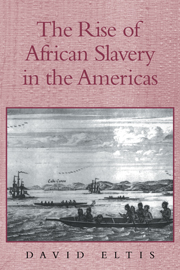Book contents
- Frontmatter
- Contents
- List of Tables
- List of Maps
- Preface
- Abbreviations
- Chapter 1 Slavery and Freedom in the Early Modern World
- Chapter 2 The English, the Dutch, and Transoceanic Migration
- Chapter 3 Europeans and African Slavery in the Americas
- Chapter 4 Gender and Slavery in the Early Modern Atlantic World
- Chapter 5 Productivity in the Slave Trade
- Chapter 6 Africa and Europe in the Early Modern Era
- Chapter 7 The African Impact on the Transatlantic Slave Trade
- Chapter 8 The English Plantation Americas in Comparative Perspective
- Chapter 9 Ethnicity in the Early Modern Atlantic World
- Chapter 10 Europe and the Atlantic Slave Systems
- Epilogue on Abolition
- Appendices
- Maps
- Sources and Bibliography
- Index
Chapter 9 - Ethnicity in the Early Modern Atlantic World
Published online by Cambridge University Press: 05 August 2012
- Frontmatter
- Contents
- List of Tables
- List of Maps
- Preface
- Abbreviations
- Chapter 1 Slavery and Freedom in the Early Modern World
- Chapter 2 The English, the Dutch, and Transoceanic Migration
- Chapter 3 Europeans and African Slavery in the Americas
- Chapter 4 Gender and Slavery in the Early Modern Atlantic World
- Chapter 5 Productivity in the Slave Trade
- Chapter 6 Africa and Europe in the Early Modern Era
- Chapter 7 The African Impact on the Transatlantic Slave Trade
- Chapter 8 The English Plantation Americas in Comparative Perspective
- Chapter 9 Ethnicity in the Early Modern Atlantic World
- Chapter 10 Europe and the Atlantic Slave Systems
- Epilogue on Abolition
- Appendices
- Maps
- Sources and Bibliography
- Index
Summary
European overseas expansion and the slave systems in particular triggered an unprecedented intermixing of peoples in the Atlantic world. Social identity (more broadly, ethnicity), nationhood, or the way peoples group themselves beyond the confines of their extended family or kin, was probably more important than the profit motive in reshaping that early modern world. Chapter 3 has argued that European-controlled slavery in the Americas cannot be understood without recognizing the differences between the nature of European and African self-identification. Europeans defined as insider anyone brought up as European. Africans drew the insider line around an area somewhat less than subcontinental in scope. Without such marked differences between these two self-concepts, slavery would not have been confined exclusively to Africans. Europeans thus entered the era with a conception of self that included some recognition of the subcontinent in which they lived as a defining entity. For Africans, no comparable perception existed and, initially, the terms Africa and Africans had meaning only to Europeans. Conceptions of separate group identities were no less pronounced in Africa than in Europe, but in Africa functioned without any overarching sense of the African continent as a whole. Elizabeth Isichei has convincingly argued that the Igbo came to see themselves as a people or nation only in the aftermath of European contact. Obversely, loyalties to kinship and, secondly, more distant associated lineages that were so important in Africa, had only weak echoes in Europe.
- Type
- Chapter
- Information
- The Rise of African Slavery in the Americas , pp. 224 - 257Publisher: Cambridge University PressPrint publication year: 1999



